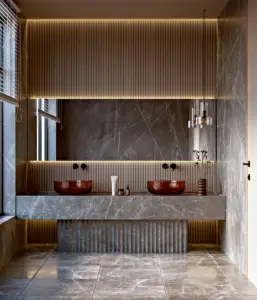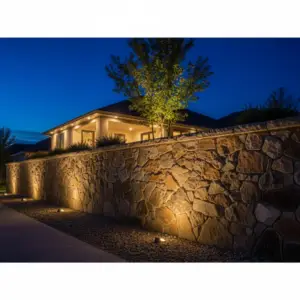by George House/26,June,2025
When planning your kitchen, the decision to use either quartz or marble goes beyond aesthetics. Both surfaces have different maintenance requirements, which impact daily life in varying degrees. That is why with regard to spills and scratches, heat, and moisture, both durability and flexibility must key into your choice of material.
This guide allows you deep comparison analysis on quartz and marble so that you can make an informed and wise selection for your kitchen. So, keep reading!
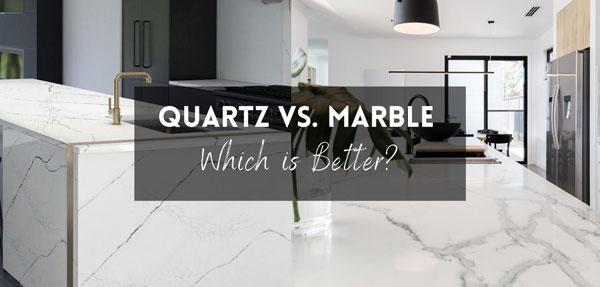
1) Understanding the basics: Quartz vs Marble
i) What is Quartz?
Quartz is a good example of a stone manufactured by people using natural materials. The composition of the finished product requires about 90 to 95 per cent of crushed quartz crystals (SiO₂) along with polymer resins and color pigments. The mixture is pressed into shape, then cured under heat and pressure to create a solid surface.
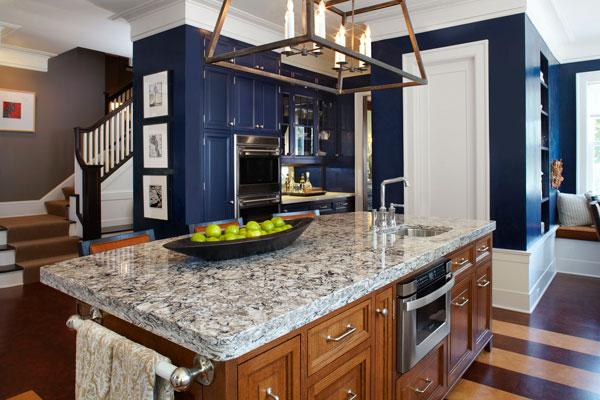
ii) What is Marble?
Marble is a metamorphic rock that arises from the transformation of limestone (calcium carbonate) through intense heat and pressure within the Earth’s mantle. Along with the aesthetics, this natural process grants marble its veining – intricate patterns created during formation, which many find beautiful.
Despite being visually appealing, compared to quartz marble has some disadvantages which will be discussed in detail in the next section. So stick around!
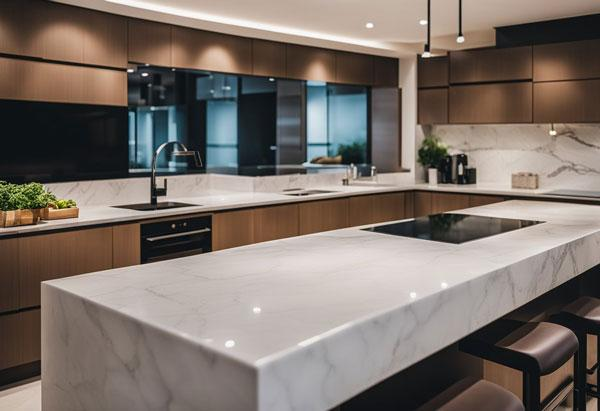
George Marble is integrating Italian production systems, which makes us one of the leaders of stone manufacturers. We offer distinct stone programs to suit large Architectural projects such as custom cutting of granite, exotic onyx,quartzite, marble and other precious natural stones.
2) Durability Features Comparison: Quartz vs Marble
Like any kitchen appliance, choosing a countertop requires attention to detail, especially on how it will hold up over the years. For this purpose, we will analyse marble and quartz countertops, comparing their features in durability features!
i) Scratch Resistance: Quartz vs Marble
- Quartz: As we have discussed before, the durability of quartz results from blending hard quartz crystals (silicon dioxide) with strong resins which makes a dense surface. Because of this feature, quartz is extremely scratch-resistant. Therefore, utensils, crockery, and even small gadgets can be used without worrying about scratching.
- Marble: In contrast to that, marble is far softer because it is formed from limestone which consists predominantly of calcium carbonate and thus very prone to scratching. Additionally, on the Mohs Hardness scale it sits at 3 while Quartz sits at 7.
Outcome: With daily use, quartz prevails due to its superior resistance against scratches.
ii) Heat Resistance: Marble vs Quartz
- Quartz: The crystals found in quartz are heat resistant; however, the resins (a type of plastic glue) used to bind them will weaken or discolor over 150 degrees centigrade (302°F). Styling hot pans of quartz surfaces may risk damage and cracking.
- Marble: Since marble forms under heat and pressure, it can withstand moderate heating without warping or melting. However, extreme heat that is focused may still lead to thermal shock, which will cause cracks as well as dark spots on marble over time.
Outcome: Undoubtedly, both materials cannot withstand harsh extremes of temperature unconditionally. Thus, protecting both countertops with trivets mitigates this issue. Marble has a slight edge, but it also needs precautions for safe use.
iii) Stain Resistance: Quartz vs Marble
- Quartz: Stains from oil, wine or juice will find it hard to penetrate into quartz surfaces because it is non-porous, meaning it lacks tiny openings. This property protects quartz surfaces very well from bearing stains, making them easy to maintain. Thus, in most cases, marks can be wiped away easily.
- Marble: Alternately, marble has small pores which can trap moisture as well as acidic compounds. Thus, substances like lemon juice and tomato sauce lead to etching that results in dull white spots on the surface of marble.
These substances greatly reduce its beauty, and without regular sealing, make the surface increasingly rough over time.
Outcome: From what we have known above, quartz seems to be best for stain resistance, whilst considering messy cooking and ergonomically user-friendly kitchens.
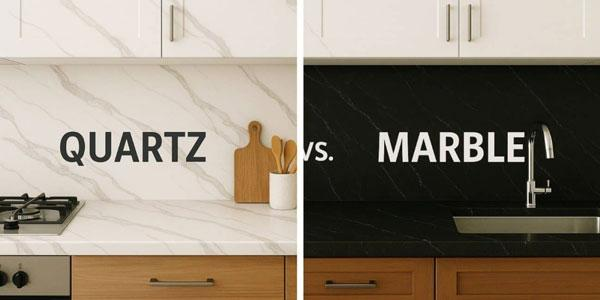
iv) Impact Damage: Marble vs Quartz
- Quartz: In a kitchen setting or a food preparation area, it is common for heavy kitchen items like pans, plates, or even sharp tools to fall from time to time. Quartz, due to its dense packing and strength, does not crack with such impacts, so it tends not to chip. The stone-resin combination also helps with shock absorption.
- Marble: Compared to quartz, marble is more brittle physically because of its crystalline structure. It means that striking anything hard or sharp increases the chances it will chip or crack. Even when glass or a cutting board falls, it tends to have pre-cuts from shattering while decaying gently.
Outcome: When talking about impact resistance, quartz yet again reigns supreme as it damages less than marble does.
v) Moisture Resistance: Quartz vs Marble
- Quartz: Since quartz is non-porous, it does not absorb water, making it waterproof. This means no need for sealing and zero worries about water-related damage or internal mold growth in the quartz surface.
- Marble: Unlike quartz, marble is porous and can soak up water if not sealed. Thus, this causes discoloration and deterioration of the stone.
Outcome: Thus, I must say that water-sensitive areas, like around sinks or wet counters, are better served with quartz.
vi) Maintenance Requirements: Marble vs Quartz
- Quartz: Its maintenance is low and simple to perform because it doesn’t absorb liquids. A simple rinse with soap and water will do wonders.
- Marble is fundamentally more difficult to maintain when compared to quartzite requires sealing every few months up to annually. Cleaning must also be done with gentle pH-neutral products so that it won’t damage the surface with acids or harsh chemicals.
Outcome: Thus, Quartz kitchen requires less effort in maintaining and looks new compared to marble flooring.
vii) Long-Term Appearance: Quartz vs Marble
- Quartz retains its color and shine for many years. As a synthetic material, the pigments used are stable, and the surface is shielded by resins, which reduces dulling.
- Marble undergoes transformation throughout time. It can develop a patina which gives the material a soft and aged look. Some admire the effect for adding character, while others prefer a more polished style. Marble can also fade, stain, or etch if not properly maintained.
Outcome: Year after year, quartz looks unchanged while marble can age beautifully—but only when well maintained.
3) Applications of marble vs Quartz Kitchen
Quartz
- Quartz for Countertops: These surfaces can be quartz, as it is strong and smooth. You can cut, mix, or prep food with no tension about any damage to kitchen surface.
- Kitchen Islands: It also takes care of daily kitchen tasks such as cooking and cleaning. It is easy to wipe clean.
- Around the Sink: As mentioned earlier, quartz does not absorb water, so it will not grow mold or stain with time. Therefore, it will remain new for a long duration.
- Work Zones: Since it’s tough and doesn’t need sealing, quartz is durable enough for busy zones that require more heavy kitchen equipment.
Marble
- Baking Areas: Its low temperature assists users during the rolling of dough or making pastry, providing coolness.
- Backsplashes: Thick sections don’t receive a lot of damage. Having these areas constructed from marble will enhance charm and cause no harm.
- Wall Panels: Marble may be utilised on walls, enhancing their softness, creating a pleasing impression without being overly sophisticated.
- Low-use counters are zones where little cutting and spills take place; thus, stylish countertops created from marble are suited there.
summarizingTable: Which is better, Quartz or Marble?
| Quartz | Marble | Winner | |
| Scratch Resistance | Strong | Soft | Quartz |
| Heat Resistance | Moderate | Better | Marble |
| Stain Resistance | Resistant | Porous | Quartz |
| Impact Resistance | Durable | Fragile | Quartz |
| Moisture Resistance | Waterproof | Absorbent | Quartz |
| Maintenance Needs | Easy | Demanding | Quartz |
| Long-Term Appearance | Consistent | Costly | Quartz |
Thus, having considered all the features analysed together, it emphasise how much quartz outperforms in every way. If your kitchen sees lots of activity, you need the peace of mind that quartz brings. But if you’re looking for something more graceful and don’t mind the maintenance, marble has certain charms that quartz cannot completely imitate.
4) Conclusion
In short, having knowledge about both materials certainly makes it easier to determine which will better suit your kitchen. As for quartz, these countertops are tough, stain-resistant, and have very little maintenance. If you enjoy cooking, then having a countertop that stays looking nice with very little effort makes quartz a smart choice.
On the other hand, marble has an ornate, soft appeal, but unfortunately is more delicate and harder to take care of. It can be gorgeous in a space that does not see regular use, like a formal dining room or event space. Besides that, if you are looking to buy surface materials, then George Group is also a great store to check out.
Our company does indeed offer quality materials alongside our years of experience in the production line. We also propose help from our expert team in selecting the right one that suits the area you need it for. So, feel free to contact us right away!



